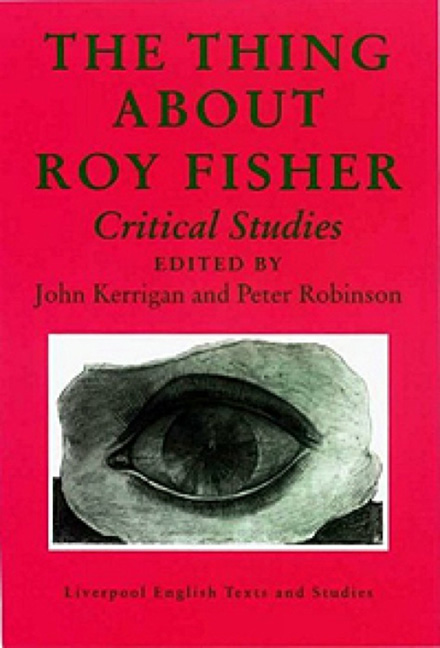Book contents
- Frontmatter
- Contents
- Notes on Contributors
- Acknowledgements
- Abbreviations
- Introduction
- 1 Roy Fisher on Location
- 2 ‘Menacing Works in my Isolation’: Early Pieces
- 3 TheWork of a Left-Handed Man
- 4 Osmotic Investigations and Mutant Poems: An Americanist Poetic
- 5 ‘Making Forms with Remarks’: The Prose
- 6 Cutting-Edge Poetics: Roy Fisher's ‘Language Book’
- 7 A Burning Monochrome: Fisher's Block
- 8 ‘The Secret Laugh of the World’
- 9 ‘Exhibiting Unpreparedness’: Self, World, and Poetry
- 10 ‘Coming into their Own’: Roy Fisher and John Cowper Powys
- 11 A Furnace and the Life of the Dead
- 12 Last Things
- Roy Fisher: A Bibliography
- Indexes
2 - ‘Menacing Works in my Isolation’: Early Pieces
- Frontmatter
- Contents
- Notes on Contributors
- Acknowledgements
- Abbreviations
- Introduction
- 1 Roy Fisher on Location
- 2 ‘Menacing Works in my Isolation’: Early Pieces
- 3 TheWork of a Left-Handed Man
- 4 Osmotic Investigations and Mutant Poems: An Americanist Poetic
- 5 ‘Making Forms with Remarks’: The Prose
- 6 Cutting-Edge Poetics: Roy Fisher's ‘Language Book’
- 7 A Burning Monochrome: Fisher's Block
- 8 ‘The Secret Laugh of the World’
- 9 ‘Exhibiting Unpreparedness’: Self, World, and Poetry
- 10 ‘Coming into their Own’: Roy Fisher and John Cowper Powys
- 11 A Furnace and the Life of the Dead
- 12 Last Things
- Roy Fisher: A Bibliography
- Indexes
Summary
Derek Slade's bibliography changes the shape of Roy Fisher's poetry. The impression of a body of mature work with its origins in the early 1960s proves to be mistaken. The addition of previously uncollected pieces brings the total for the 1950s to around forty. The output of an entire decade in the career of a major poet is nowon the record,most of it for the first time.
In 1973, Fisher observed that ‘my periods of writing have been on the whole separate’; he distinguished ‘about three periods over the twelve years … between 1958 and 1970 … [with] spaces in between’. In the light of the bibliography, both periods and spaces are identifiable, though1957, a prolific year, might be a better point of departure than 1958, a lean one. The years 1950—55 might also be considered as a distinct if sporadically productive period, followed by a barren year.
The years 1950—73 might therefore be broken down as follows:
First period 1950-55 (1956: no recorded work)
Second period 1957—61 (1961—62: one poem between February 1961 and July 1962)
Third period 1962—65 (1966—70: nine ‘false starts’)
Fourth period 1970—73
Andrew Duncan's unpublished summary of the 1950s as experienced by Fisher is exemplary in its emphasis on inhibition and reaction; in its refusal to be distracted by ‘Russian Modernism’ of any vintage; and in its scrupulous account of ‘the English literary scene’. In particular, Duncan accepts Eric Homberger's assessment of the impact of Harvard formalism, epitomized if not originated by Richard Wilbur and imported to Oxford by Donald Hall. Locating Fisher amongst ‘the poets of formalism,with rhyme and strict metre’, against whom he was ‘reacting … at the outset of his career’, Duncan makes an ironic suggestion:
while Fisher's American influences turned English conservatives against him (but got him published in Origin in the 1950s), the chefs de file of the formalism around him were also American … Perhapswe could, by inversion, consider himas a product of the 1950s, a mysterious decade of formalism…
It is indeed illuminating to consider Fisher's work as ‘a product of the 1950s’, but the process is not a simple ‘inversion’ of prevailing formalism.
- Type
- Chapter
- Information
- The Thing About Roy FisherCritical Studies, pp. 47 - 85Publisher: Liverpool University PressPrint publication year: 2000



